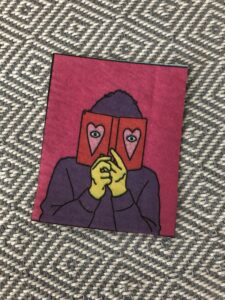 It appears that we are shedding our masks. We can walk freely in and out of our homes, ride the elevator, put out the trash, pick up the mail and not fog up our glasses. We greet friends without having to read their eyes and foes without pretending we don’t recognize them. We can smile with fresh lipstick on, instead of a color coordinated mask.
It appears that we are shedding our masks. We can walk freely in and out of our homes, ride the elevator, put out the trash, pick up the mail and not fog up our glasses. We greet friends without having to read their eyes and foes without pretending we don’t recognize them. We can smile with fresh lipstick on, instead of a color coordinated mask.
At the same time, I keep seeing masks everywhere. I’m watching Money Heist, the Spanish series on Netflix (La casa de papel, 2017-2020). The perpetrators of the robbery as well as the kidnapped victims all wear Dalí-like masks—mustaches and all—which at first serves as comic relief for the high tension plot. But it’s also very unnerving to viewers and the fictional Spanish police alike, since no one can differentiate between criminals and hostages.
I see in YouTube the fascinating performance by Jabbawockeez. The hip-hop dancers all wear generic white masks to emphasize the universality of the genre and the similarity of the performers: “a disguise that both unifies and camouflages the dancers” (The New York Times, June 11, 2021).
Then I read Haruki Murakami’s First Person Singular for my English reading group (translation by Philip Gabriel). The last collection of the famous Japanese writer is sufficiently unique to confirm my title of “enfant terrible” of the group. As one of the members said, “I knew immediately that Concha was up to her old tricks.” The eight stories are original, whimsical, elegant like all of Murakami’s writing. I chose the last story, “First Person Singular,” which titles the book. The group warms up to the protagonist/narrator, a writer and lover of mystery novels, who wears Paul Smith and Ermenegildo Zegna suits. They lose faith in him when a woman in a bar interrupts his reading, telling him that she knows he did something awful to one of her friends. We are all puzzled by the oneiric-like ending, perhaps the mystery that the narrator was reading.
I could read Murakami just to luxuriate in his similes: a heart beats “as if a terrified mouse were racing about inside,” while other heart is excited “as if a group of lively dwarves were bungee-jumping inside my tiny ribs;” tufts of hair stick out “like the wings of birds when they bathe,” love is “like having a mental illness that’s not covered by health insurance,” memories are “like a boomerang you threw that whirls back to you when you last expect it,” eyes are devoid of emotion “as if…judging whether some dried fish at the back of the fridge was still edible or not;” other eyes narrow “like a bacteriologist isolating some new strain of pathogen.” Please, allow me one more metaphor: the protagonist of “First Person Singular” feels the gaze of the woman on his back “that sensation, like being jabbed with a short sharp needle, penetrated the fine cloth of my Paul Smith suit to make a deep, lasting mark on my back.”
My favorite story in this collection is “Carnaval,” based on Robert Schumann’s composition, with its hard sound “like snapping a three-day-old baguette on your knee.” The protagonist, an alter-ego of Haruki Murakami, loves music and Carnaval is the one piano piece he would take to a desert island (Three other stories have musical themes in this collection: “Cream,” “Charlie Parker Plays Bossa Nova,” and “With the Beatles.”) Of course, a carnival evokes mask wearing and Murakami ties music and masks brilliantly: “All of us, more or less, wear masks. Because without masks we can’t survive in this violent world. Beneath an evil-spirit mask lies the natural face of an angel, beneath an angel’s mask lies the face of an evil-spirit. It’s impossible to have just one or the other. That’s who we are. And that’s Carnaval. Schumann was able to see the many faces of humanity—the masks and the real faces—because he himself was a deeply divided soul, a person who lived in the stifling gap in between the two.”
And I have to agree with Murakami; we are all still wearing masks, whether we have to wear one to protect us from Covid or not, Concha
The illustration by Jim Stoten appeared in The New York Times’ review of First Person Singular (April 25, 2021).
